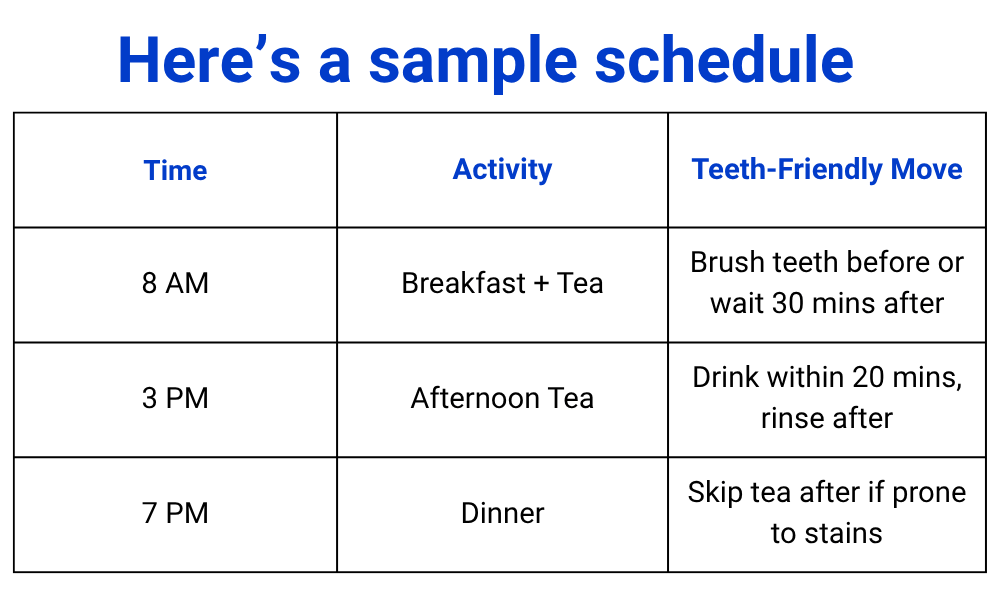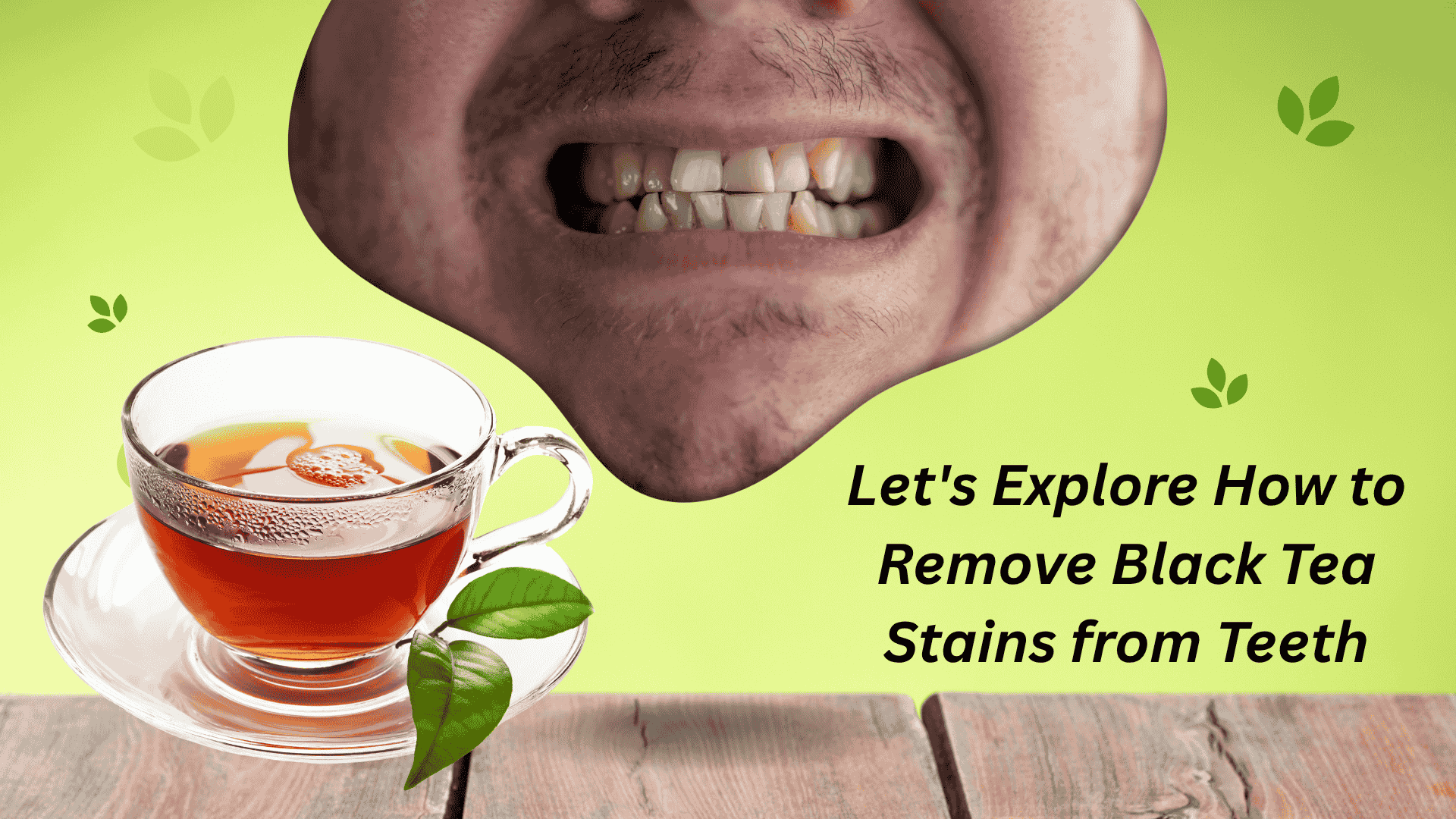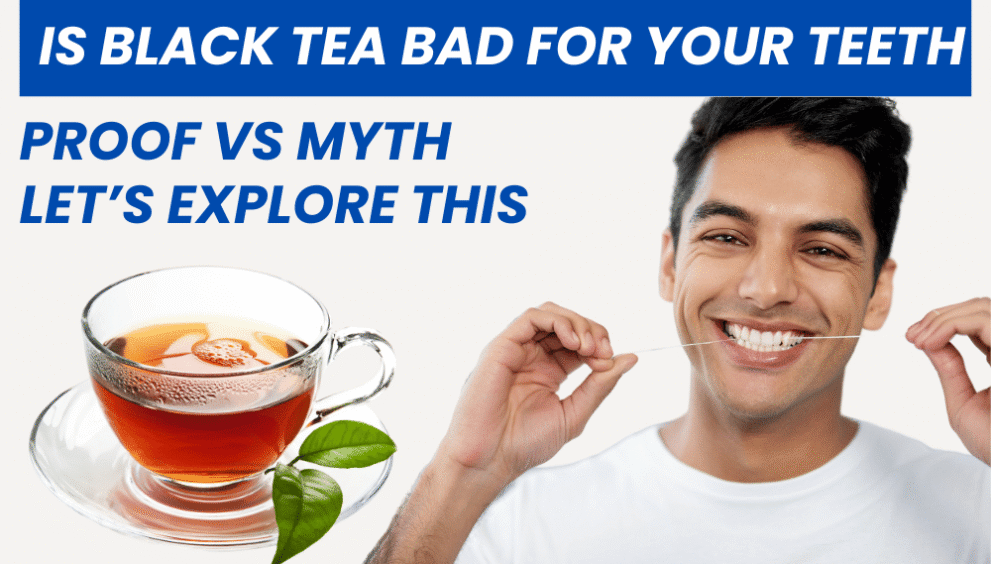Black tea is a beloved energy-boosting drink due to its excellent properties, but it’s time to prove it. Is black tea bad for your teeth? Science can confirm whether this is a myth or a reality.
Does Black Tea Harm Your Teeth?
You sip black tea for an energy boost, but what happens is that your daily beloved cup of black tea is secretly staining your smile. Most people associate teeth damage with candies, sodas, and sugar. Perhaps black tea, praised for its rich antioxidant content, may be causing significant harm to your dental health. Here is a twist: black tea might not be the villain you’re expecting. In fact, under the right circumstances, it can protect your teeth. Confused? You’re not alone. In this in-depth exploration, we’ll reveal hidden truths, debunk myths, and show you how to enjoy black tea without compromising your smile, backed by scientific research.
No, Black tea is not bad for your teeth if you consume it wisely.
Although it can cause mild staining due to tannins, its fluoride and antibacterial properties protect teeth from cavities and gum disease.
What’s in Black Tea That Affects Your Teeth?
A daily cup of black tea can wake up and interact with your teeth in surprising ways. Its rich flavor comes from tannins and polyphenols. These same elements can either stain your enamel (Enamel is the tough, outermost layer of your teeth, acting as a protective shield) or strengthen your teeth, depending on how you consume them. From acidity levels that rival coffee to cavity-fighting fluoride, let’s break down what’s in your tea and how to enjoy it without compromising your smile.
Tannins and how they stain teeth
Tannins are natural compounds found in tea, coffee, and red wine that can stain teeth. They attach to proteins in tooth enamel, forming yellow or brown stains over time.
Acidity level and enamel erosion
Black tea has a pH of 4.9-5.5, which can weaken the enamel if used excessively. Drinking multiple cups of black tea daily, sipping it slowly over long periods, and combining it with citrus or sugar (which may increase acidity) are risk factors for enamel erosion. You should wait 30 minutes before brushing because softened enamel needs time to harden again. Drink with food to neutralize the acid.
Natural sugars (if any) and additives like honey or milk
Pure black tea contains no natural sugars; it only has trace minerals. You can add
- Honey or Sugar: Feeds harmful bacteria and increases the risk of cavities.
- Milk: Reduces staining but adds lactose (a mild sugar)
- Lemon: Increases acidity and accelerates enamel erosion.
Comparison with coffee and other teas

Common Dental Concerns Related to Black Tea
Black tea is one of the beloved drinks, but its effects on oral health are considered wrong. While it offers benefits such as natural fluoride and antibacterial properties, frequent use can contribute to several dental problems. Here’s a detailed look at the most common concerns and science-backed ways to enjoy black tea without damaging your smile.
Teeth staining
Black tea is fully oxidized, and it stains more than green or white tea. Longer steeping causes more tannins to be released, and hot tea slightly opens the enamel pores, increasing stain absorption. Black tea tannins bind to tooth enamel. Over time, these compounds create yellow or brown surface stains.
Why does this happen
Tannins increase the stickiness of saliva, helping to bind plaque. Added sugar or honey feeds cavity-causing bacteria. While black tea polyphenols fight harmful bacteria, sweeteners negate this benefit.
Why did it happen?
Tannins reduce saliva flow. Some black teas have caffeine, which has mild diuretic properties. Saliva protects teeth by washing away food particles, neutralizing acids, and remineralizing enamel. That’s why it’s essential.
How to Enjoy Black Tea Without Damaging Your Teeth
Black tea offers rich flavor and health benefits, but its tannins and acidity can pose a risk to your dental health. Let’s explore how to sip smartly while keeping your teeth strong and stain-free.
Practical Tips to Minimise Staining
- Use a Straw – Directs tea past teeth, reducing contact with the enamel. (Best for iced tea!)
- Rinse with Water Immediately After – Swishing water helps wash away tannins before they stick.
- Brush Before Drinking – Clean your teeth to reduce staining, as plaque attracts tannins that can cause discoloration.
- Limit Brew Time – Steeping for more than 5 minutes releases more tannins, resulting in darker stains.
- Choose Lighter Teas – Darjeeling stains less than Assam or English Breakfast.
Adding milk – does it help?
Yes,
- According to Science, milk contains casein, a protein that binds to tannins, preventing them from sticking to teeth.
- Research shows that tea with milk causes 50% less staining than black tea alone.
- Bonus: Milk contains Calcium, which helps neutralize the mild acidity of tea.
Best Milk Options:
- Dairy Milk (most effective)
- Soy Milk (works similarly to dairy)
- Almond/Oat Milk (which is less effective but better than nothing)
Pro Tip: Even a small splash helps—no need to drown your tea!
- Drinking with meals vs sipping throughout the day
Better: Drink with Meals
Why? Food stimulates saliva, which neutralizes the acidity of tea and washes away tannins before they can stain the teeth. Adding cheese or dairy to meals provides Calcium to protect enamel.
Avoid Slow Sipping Over Hours
Why? Prolonged exposure to acid/tannin keeps enamel soft longer, which increases the risk of erosion and gives stains time to set.
How to Fix
Finish your tea within 20 minutes, then rinse—time to brush and floss after tea.
When to Brush After Tea
Dentist Opinions: What Do Experts Say?
The American Dental Association (ADA) approves black tea (unsweetened) as a better alternative to soda or juice, Offering Natural fluoride that strengthens the enamel and Polyphenols that fight cavity-causing bacteria. Caution: Tannins can stain, but stains are superficial and removable.
Expert recommendations and dental studies
- Dr. Matthew Messina (ADA Spokesperson):
“If you drink tea, skip the sugar. The real damage comes from the additives, not the tea. Adding a significant amount of skim milk is an easy win.”
- Dr. Mark Burhenne (Sleep Dentist):
“Never brush immediately after tea. Please wait 30 minutes to avoid cleaning the enamel, as this allows the acid to soften it. Use a straw for iced tea to avoid neglecting the front teeth.”
- International Journal of Dental Hygiene (2018 study):
“Black tea drinkers showed 20% lower levels of cavity-causing bacteria compared to non-tea drinkers, likely due to antimicrobial polyphenols.”
- Dr. Jane Wilson, Prosthodontist:
“I tell patients to treat tea like wine — enjoy it with food, rinse afterward, and don’t let it sit on your teeth all day.”
What dentists suggest about tea consumption and oral care
Dentists’ Top Suggestions
For Consumption:
- Pair with meals to neutralize acidity.
- Limit intake to 2-3 cups per day to reduce staining and erosion.
- Skip additives (sugar, lemon, honey).
For Oral Care:
- Rinse with water immediately after drinking.
- Wait 30 minutes to brush post-tea.
- Use fluoride toothpaste to counteract mild acidity.
For Stain Prevention:
- Add milk (dairy or soy) to bind tannins.
- Get biannual cleanings to remove buildup.
- Try whitening toothpaste 1-2x/week.
How to Remove Black Tea Stains from Teeth

Although the tannins in black tea can leave stubborn stains, these safe, effective solutions will restore the shine to your smile.
Home remedies (such as baking soda and hydrogen peroxide)
A. Baking Soda Paste
How it Works:
- Mild abrasive polishes away surface stains.
- Alkaline pH neutralizes acids.
How to Use:
- Mix 1 tsp baking soda + water (or coconut oil).
- Brush gently for 1 minute once a week.
Caution: Don’t overuse (can wear enamel).
B. Hydrogen Peroxide Rinse (1.5–3%)
How it Works:
- It breaks down stain molecules (same as professional whitening).
How to Use:
- Dilute with equal parts water.
- Swish for 30 seconds, 2x/week.
Caution: Don’t swallow; it may cause sensitivity.
C. Oil Pulling (Coconut or Sesame Oil)
How it Works:
- Binds to tannins, pulling stains over time.
How to Use:
- Swish 1 tbsp oil for 10–15 minutes daily.
- Spit out, rinse, then brush.
Whitening toothpaste and mouthwash
A. Whitening Toothpaste
Best Picks:
- Colgate Optic White (ADA-approved, gentle silica).
- Sensodyne Extra Whitening (for sensitive teeth).
How to Use:
- Brush twice a day, but limit whitening toothpaste to two to three times a week if sensitive.
B. Whitening Mouthwash
Best Picks:
- Crest 3D White Luxe Glamorous White (hydrogen peroxide-based).
- Listerine Healthy White (prevents new stains).
How to Use:
- Swish for 30 seconds after drinking tea.
- When to consider professional cleaning or whitening
Can Black Tea Be Good for Oral Health?
Yes! Although black tea is often criticized for staining teeth, when consumed in moderation, it offers several benefits for oral health. Here’s what Science and dental experts have to say:
Antibacterial properties
How it works:
It contains polyphenols (especially theaflavins and catechins) that kill Streptococcus mutans (a primary cavity-causing bacterium). Reduce Porphyromonas gingivalis (linked to gum disease).
Study: Tea drinkers have 30% fewer cavities (Journal of Oral Microbiology).
Pro tip: Drink unsweetened — sugar cancels out these benefits!
Fight bad breath
How it works:
Polyphenols neutralize sulfur compounds from bacteria that cause halitosis. It is more effective than mint or gum for long-lasting freshness.
Pro tip: Swish plain black tea (chilled) as a natural mouthwash.
It may reduce plaque buildup.
How it works:
Tannins prevent bacteria from sticking to teeth, reducing plaque formation.
Study: Black tea reduces plaque by 50% vs. water (Journal of Dental Research).
Pro tip: Skip the sugar and add cinnamon or mint for a flavorful alternative.
Fluoride content and its benefits
How it works:
Black tea contains 0.3–0.5mg fluoride per cup (similar to fluoridated water).
Fluoride:
Remineralises weakened enamel. Protects against acid erosion.
Pro tip: Drink tap water (increases fluoride content).
Final Verdict: Should You Stop Drinking Black Tea?
No, you don’t have to give up black tea! In the latest era, every problem can be solved with the right solution. Although it can stain teeth and is mildly acidic, its oral health benefits far outweigh the risks if you follow smart habits.
Balanced conclusion
Black tea offers both benefits and risks for oral health. Its polyphenols fight cavity-causing bacteria, while natural fluoride strengthens enamel. The truth is that black tea is significantly better for your teeth than alternatives like soda or juice. By following these evidence-based guidelines — consuming it in moderation, maintaining good oral hygiene, and getting regular dental checkups — you can help prevent tooth decay.
However, tannins can stain teeth, and the mild acidity from overconsumption can erode enamel.
To enjoy black tea safely:
- Drink it plain (no sugar/lemon)
- Rinse with water afterward
- Limit to 3-4 cups daily
- Wait 30 minutes before brushing
Although better for teeth than soda or juice, individuals with sensitive teeth or existing stains should exercise caution. With proper care, you can reap the oral health benefits of black tea without damaging your smile. For personalized advice, consult your dentist.
Key takeaway: Developing smart habits allows you to enjoy tea while protecting your teeth.
You can confidently enjoy your daily cup while protecting your smile. Remember, when it comes to tea and dental health, proper technique matters more than complete avoidance.
FAQs About Black Tea and Dental Health
1. Does adding lemon to black tea make it worse?
Yes, lemon juice (pH ~ 2.0) dramatically increases acidity, accelerating enamel erosion. This makes teeth more porous and prone to stains. Avoid lemon in tea for dental health.
2. How often can I drink black tea without staining my teeth?
2-3 cups per day are generally safe if you use a straw; rinse with water afterward and add milk. Get a professional cleaning every 6 months. Heavy drinkers (those who consume four or more cups per day) are likely to experience gradual staining.
3. Are herbal teas safer for teeth than black tea?
Rooibos (tannin-free), chamomile (neutral pH). Dangerous: Fruit teas (often with a pH of 3-4), hibiscus (highly acidic). Black tea still offers unique benefits like fluoride and polyphenols.
4. Should I brush my teeth before or after drinking tea?
Before: Ideal – removes plaque, making stains less likely to form. After: Wait 30 minutes or more – brushing with acid damages the softened enamel. Better yet, Brush first, then rinse with water after tea.
5. Can children drink black tea without dental risks?
In moderation (1 weak cup/day maximum), but with caution:
Always diluted with milk, without sugar or honey. Through a straw. Rinse with water afterward. Better alternatives: Rooibos or weak green tea (less tainted).
6. Is drinking black tea bad for your teeth?
Not necessarily. Although it can stain and is mildly acidic, its benefits (fluoride, antibacterial polyphenols) far outweigh the risks if appropriately consumed without sugar.
7. How to Protect Your Teeth with Black Tea?
Drink with food, add milk, and use a straw for optimal enjoyment. Rinse with water afterward, wait 30 minutes before brushing, and these are the top five ways to protect your teeth with black tea.
8. How can I drink tea without ruining my teeth?
Golden rules include never adding sugar or lemon, limiting to 3 cups per day, and pairing with cheese or nuts. Use white toothpaste 2x/week. Clean teeth regularly.
9. Should I brush my teeth after black tea?
No, wait at least 30 minutes. The acidity of the tea temporarily softens the enamel. Brushing too quickly causes microscopic damage. Instead, rinse with water immediately. Chew sugar-free gum. Brush when the enamel has hardened again after it has been moistened by saliva.


